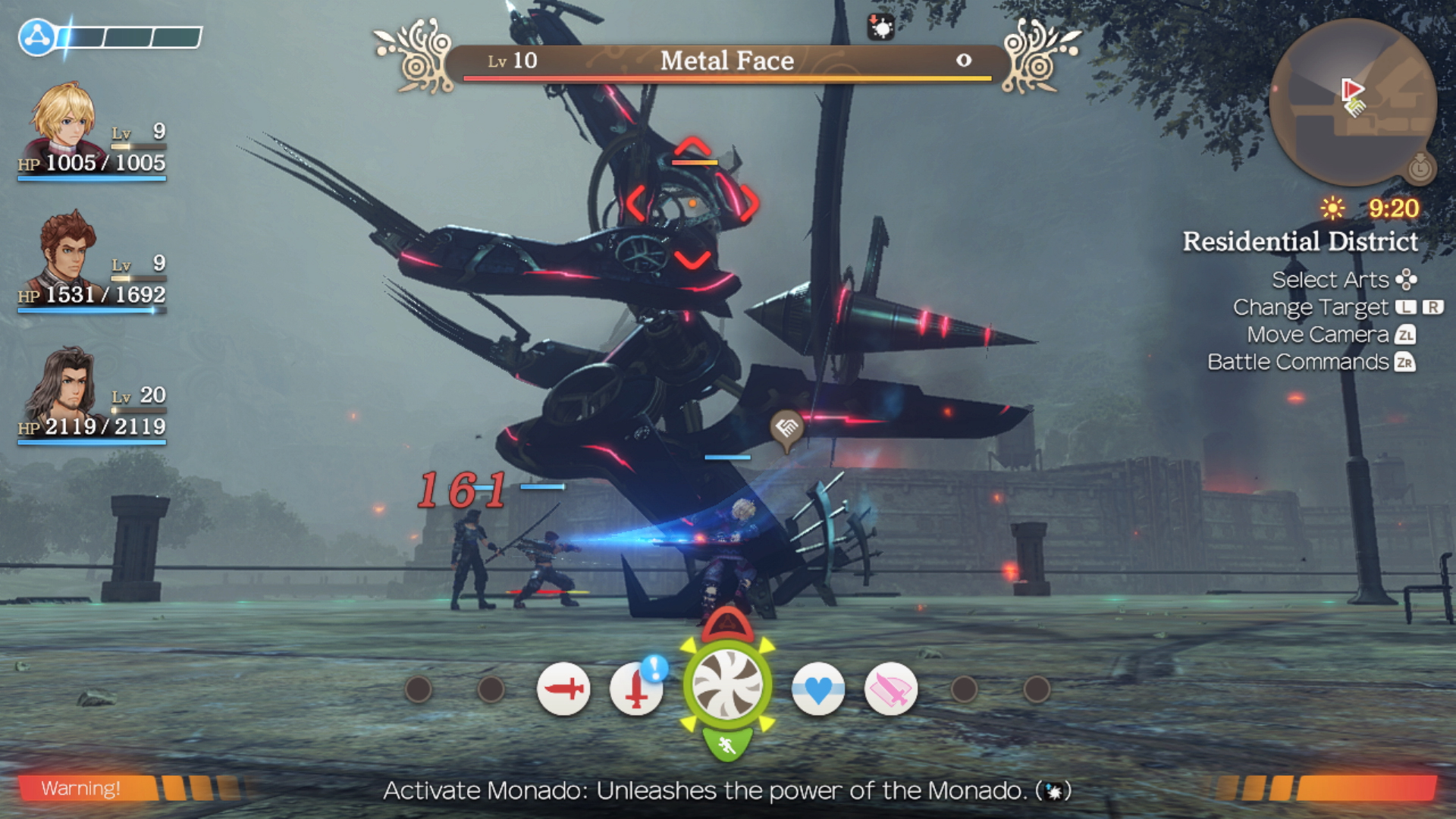Welcome to The Backlog, a series in which we will take a look back at 12 games from 2020 that, in one way or another, had a lasting impact on the video game industry.
Xenoblade Chronicles: Definitive Edition, is yet another remake that was released in 2020, and the third such game to appear in this column. The lesson it provides is that sometimes the best way to remake a game is also the simplest.
Warcraft III Reforged was an attempt to modernize the original game, with catastrophic technical results. Final Fantasy VII Remake completely rebuilt and changed that classic into something newer and, unarguably, stranger. It's nice, then, to have a successful and rather straightforward remake of an already excellent game to talk about. Xenoblade Chronicles first came out in 2010, in the latter stages of the Nintendo Wii's lifespan. It was then remade for the New 3DS in 2015, but it wasn't until May 29, 2020 that Nintendo released it on the Switch, its most popular home console ever.
In terms of its approach to updating a previous game for modern players, Xenoblade Chronicles: Definitive Edition is somewhere between the 2015 re-release and a full remake, a la FF7 Remake. The base game is back mostly untouched, save for some quality-of-life changes and updated graphics. However, Nintendo also added in an epilogue that takes place a year after the main game, which helps connect it to the bigger Xenoblade Chronicles universe.
The Definitive Edition subtitle fits here, as this remake/remaster/re-release improves on the base game in every way, providing the most complete way to experience one of the best games of the 2010s. By releasing XBC: DE on Switch, Nintendo not only allowed new players to experience all of the thrills of the 60-plus hour game, but also solidified for itself a new tentpole franchise, turning Xeno from a series with a lengthy and often confounding history, ranging back to Xenogears in 1998, into a mainstay that has now become a key pillar in the company's strategy. Not bad for what, on paper, is simply just another remake.
What Is It?
At its core, Xenoblde Chronicles is an open-world Japanese role-playing game (JRPG). It is both a perfect example of the genre and something that bucked contemporary trends when it first came out in 2010. I have to talk about Final Fantasy again here, as the most recent release in the genre's biggest and most famous series, 2009's Final Fantasy XIII, is a perfect antithesis to Xenoblade Chronicles. Whereas FFXIII took the open world aspect almost entirely away, leading to criticisms that it was a hallway simulator until it finally opened up in the final 20 percent or so of the game, XBC is almost overwhelming in the freedom it gives the player.
After a brief introduction, the player is set loose on Colony 9 and its surrounding areas, with plenty of markers on the map to fill out. There are quests, so many quests, that range from killing five of a specific monster to gathering materials for the colony's many inhabitants. These inhabitants serve as more than window dressing; the main character, Shulk, can build relationships with almost every NPC in the area, and as those relationships improve, more quests open up and rewards scale up in power and importance. Despite my well-documented hatred of map-filling open world games, XBC provides a tangible rationale for why a player would want to complete everything before moving on in the story.
As for that story, it's relatively straightforward anime fare. Shulk, along with his buddies Reyn and Fiora, live in constant fear of machine attacks a la Terminator, though the colony has a secret weapon against the Mechons (no one strained any brain cells with that name) in the form of the Monado, a legendary sword that can cut through mechs like paper. The Monado exacts a toll on the wielder, however, as evidenced by Dunban, Fiora's brother and the hero of the colony. When the game starts, Dunban has been incapacitated by the Monado, but Shulk, unsurprisingly given that he is the main character, finds out that he can use the sword without a penalty. Following an early invasion that sees the apparent death of Fiora, Shulk and Reyn head out into the world to exact revenge on Metal Face, one of the few talking Mechon units and the one who seems to kill Fiora, and stop the invasions for good.
Again, this is not revolutionary stuff, but XBC leans into its genre trappings well, providing enough twists and turns alongside plenty of experience grinding and equipment management to justify its lengthy runtime. Along the way, Shulk and Reyn meet archetypal characters, from the magical princess Melia—protagonist of the aforementioned epilogue—and the cute-yet-obnoxious Nopon Riki, who is as adorable as he is useful in battle. It would take too long, and dive into too many spoilers, to explain the entire plot of the game, but it's a given that things are not what they seem with the Mechons and their human counterparts, the Homs.
As for Definitive Edition, it's mainly an update of 2010 graphics to 2020 standards, along the lines of Xenoblade Chronicles 2, which released on the Switch in 2017. There are quality-of-life changes, such as positional indicators for certain abilities in combat that have bonuses if, say, the character using them is behind an enemy or to its side. There are minor changes all over the place, from the ability to change the look of a character's armor without sacrificing combat stats, or markers for the many side quests that make their completion much more straightforward. (I have not had to use walkthroughs in my playthroughs of XBC thanks to these markers.) The epilogue is also worth playing after the main story wraps up, though it's more of a bonus than a real selling point here.
What Went Right?
The combat system is noticeably more dynamic than a pure turn-based JRPG. The player controls just one character in a party of three, with the other two being operated by to the game's AI, which does a fine enough job with every character, save for Shulk himself and the magic-wielding Melia. While in combat, the player has a handful of abilities that they can use at any time, and these abilities often incur a cooldown period before they can be used again. There are also super moves that must be charged up, and they're among the most visually striking in the game. There is also a timing-based aspect to these abilities, and that keeps things moving at an active enough rate of play to make the hours upon hours of fights interesting.
The story is also a plus in XBC, thanks to the charming characters and relatively straightforward over-arching plot. While the pacing falters at times, when XBC locks into a big story set-piece, it's hard to put down. As an example, the party heads to a location called Prison Island midway through the game, which serves both as a dungeon and a climax, giving the player both challenging battles against a mythical creature and an encounter with Metal Face. Once completed, lore takes over, and there are two shocking twists deployed back-to-back, concerning the creation of the Monado and the status of a missing character. It's all expertly conveyed in an emotional set of cutscenes, and served for me as a rallying point to charge into the back half of the game.
Specific to the Definitive Edition, all of the quality-of-life changes are effective, ranging from "a nice addition" to "game-changing." If there is one flaw with XBC, the original, it's that it can become quite easy if the player completes every side quest, as the characters will become over-leveled to the point of one-shotting most enemies. Thankfully, the remaster comes with Expert Mode, which allows the player to take away experience points from their characters, allowing a personal level of control on the difficulty. Want to be as overpowered as possible as early as possible? You can do that just fine, but if you want to keep things more challenging, it's easy enough to nerf your own characters to provide a smoother difficulty curve.
What Went Wrong?
It's not all good, though, and most of the problems with XBC come from the original game. The open world aspect is mostly optional, but the game doesn't succeed if one doesn't engage with the relationship-building mechanic. In turn, this is what causes the pacing issues, as a pressing threat takes a backseat to running around quite large maps in order to satisfy the NPCs' demands. It's up to the player to prioritize what quests they need to do in order to advance these side stories and rewards, and it's not always clear how to do that prioritizing. Things can grind to a halt for hours on end; there's a later zone in a snowy, labyrinthine mountain range that put me off from the game the first time I played it, because I felt so committed to completing the exploration aspect.
The other problem is that, man, the voice acting is really grating. For some god-forsaken reason, a lot of the important characters have Cockney English accents, and they will not shut up. The main offender of this is Reyn, who is with the party for almost the entire game; his in-combat dialogue makes me want to go play anything else. Even the more subtle voice acting eventually gets on my nerves, thanks to the repetition across battles, and I haven't even mentioned how annoying Riki's yapping becomes after only a couple of hours with the little ball of attitude.
Were People Normal About This Game?
Honestly, and quite surprisingly, yes, they were. At least, the remaster didn't put many people off of the main game, and that makes sense. Given that the Definitive Edition is mostly a straight-up improvement from the 2010 original, there's little to complain about, and a lot to celebrate. Expert Mode especially was well-received, as one of the bigger problems in JRPGs as a whole is that the games can get too easy if the player commits to breaking its rules through excessive grinding. If there was any bit of negativity, it had to do with the epilogue, which is a nice addition but doesn't do much of anything revolutionary, and is quite short to boot. Still, though, given that it is completely optional, the inclusion of the epilogue didn't harm the perception of the main game whatsoever. More serious complaints lobbed at the remaster had more to do with the original game, which is, understandably, not everyone's cup of tea, and no remaster was going to change that.
The reviews followed suit; the New 3DS remake ran into some technical issues, given that handheld console's limitations, but the Switch version cleaned most of that up. It's safe to say that the Definitive Edition was widely accepted as the best version of Xenoblade Chronicles, which is about as well as a remaster can go in terms of reception.
What's Happened Since?
Though there had been five games in the broader Xeno series, including a sequel to XBC released three years before Definitive Edition, the remaster was a turning point for the series and for Nintendo. Similarly to how Fire Emblem rose from a curiosity to a core piece of the company's strategy, first with Awakening in 2013 and then with the critically acclaimed Three Houses in 2019, XBC: DE opened up this oftentimes weird and always engaging JRPG to a broader audience.
Xenoblade Chronicles 2 had already proven the series could sell—though much of that was likely tied to releasing just a few months into the Switch's cycle, and, crucially, long enough after the release of the console that it was more widely available—but Xenoblade Chronicles: Definitive Edition was proof that people would continue to buy games in this series, even if they might have already owned the original. The timing for the release of the remaster couldn't have been better, as the spike in Switch sales at the start of the pandemic meant that more people than ever had access to the game.
Since the release of XBC: DE, there have been two big Xeno releases on Switch. Xenoblade Chronicles 3 came out in 2022, and sold extremely well: 1.91 million sales in its first year. And in March of 2025, a remake of Xenoblade Chronicles X, a mech-fighter spin-off first released on Wii U (a console very few people owned), arrived with plenty of fanfare and critical love. It's safe to say that the release of XBC: DE helped boost the profile of both of these games, aided by Shulk's inclusion in both Super Smash Bros. 4 and, more importantly, Super Smash Bros. Ultimate, the best-selling Smash game ever and the third-best selling Switch game as of time of writing.
There's no news yet on the next game in the Xeno series, but that has less to do with fading interest in the series and more to do with the recent release of XBC X: Definitive Edition. Just as fans of Fire Emblem are awaiting the next episode in that saga, following 2023's disappointing Engage, so too are Xeno-heads on the lookout for whatever comes next. Whether that's XBC 4 or yet another pivot in the history of Xeno games is yet to be seen, but it would be shocking if there isn't a new game in the series for the Switch 2, which releases in June of 2025.
Is It Worth Playing In 2025?
Whether you will enjoy Xenoblade Chronicles: Definitive Edition or not depends on your affinity for a classic JRPG adventure with modern touches. I don't think XBC as a whole will convert any JRPG doubters, but if any game in the series will latch on to curious gamers, it would be the Definitive Edition. It's the start of a long journey down the road of the Xeno saga, and that can be intimidating, doubly so for the slow pace most present in the first half of Xenoblade Chronicles. However, those who push through and arrive that the point where story, gameplay, and aesthetics all coalesce into a singular gaming experience, the reward is bountiful. For that reason, Xenoblade Chronicles: Definitive Edition earns an 8.1 on the Defector Replayability Ability Scale.






